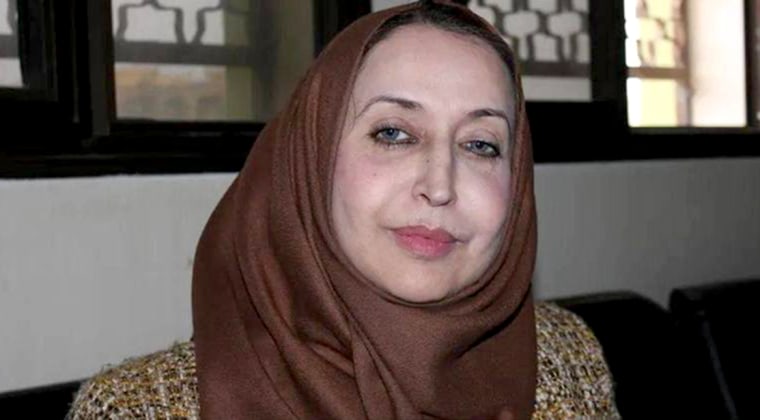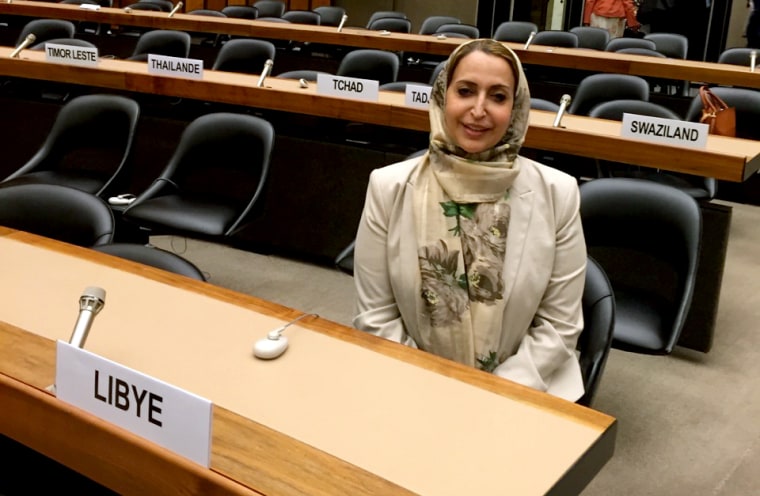The American family of a Libyan politician is pleading for her safe return after she was dragged from her home in Benghazi by military-clad officials last week.
Seham Sergiwa, a women’s rights advocate and an elected member of the House of Representatives, was kidnapped on July 17 by members of the Libyan National Army militia, her relatives claim. The militia is led by Khalifa Haftar, a warlord once praised by President Donald Trump.
“I was in a state of shock. It was really very difficult to comprehend,” Adam Sergiwa, 60, told NBC News about learning the news of his sister’s disappearance.
Adam Sergiwa, who lives in La Porte, Indiana, said he received a text message on July 17 from one of his nephews in Libya explaining that his sister had been taken from the family’s home in the middle of the night. The politician’s husband and one other family member were shot in the legs during the abduction.
No one has yet claimed responsibility nor demanded a ransom, but Adam Sergiwa said a threatening message was spray-painted on his sister’s house: “don’t cross the line of the army.”
The family suspects the Libyan National Army to be behind the attacks because Seham Sergiwa was openly critical of the militia. The mother of five had spoken against the army’s recent siege on Tripoli in an interview with Egypt-based media the day before she was kidnapped, Adam Sergiwa explained.
“She was very vocal and very critical,” he said. “She believed in a peaceful solution for the crisis.”
The Libyan House of Representatives also blamed Haftar for Sergiwa's abduction and called on the international community to help secure her release.
"We hereby hold the rebel Khalifa Haftar fully responsible, legally and morally, for the abduction of Ms. Sirgiwa and for jeopardizing her life," the house said in a statement, but offered no evidence to back its claim.
If the family’s and lawmakers' suspicions are correct, the kidnapping signals the extreme degree of authoritarianism embodied by the Libyan National Army and forebodes escalating conflict in the country, experts say. Haftar’s militia is allied with the House of Representatives in the eastern part of the country, including the city of Benghazi.
“It’s an indication of further things to come should others step out of line,” Tim Eaton, a Middle East and North Africa researcher at the London-based think tank Chatham House.
The country has been divided since 2011 when the late dictator Moammar Gadhafi was toppled in the Arab Spring.
Haftar had been living in exile for two decades in the United States but returned to Libya following Gadhafi’s fall. His militia, which rejects the United Nations and U.S.-backed government in Tripoli, has been leading an attack on the city since April. His militia receives support from Egypt, the United Arab Emirates and reportedly Saudi Arabia.
Haftar’s opponents have offered that he could retain control over Benghazi and other areas under the condition that he subject himself to civilian oversight, such as the House of Representatives, Eaton explained.
But the kidnapping is a reminder that he has continuously rejected political authority, Eaton said. “His behavior indicates that he believes in military solutions.”

Adam Sergiwa said family members and neighbors who witnessed last week's attack have told him the roughly 20 to 25 perpetrators who stormed the house clearly appeared to be members of a battalion of the militia that is led by Haftar's son. The two relatives who were injured are recovering, but Adam Sergiwa said family members in Libya have been denied visitation by the local hospital without explanation.
Seham Sergiwa’s disappearance also signals the declining rights of women who had fought to carve out a role in the public sphere during the Arab Spring, said Inga Trauthig, a research fellow at the International Centre for the Study of Radicalisation and Political Violence at King's College London.
“The initially peaceful protests turned into an armed confrontation, and with this, women were continuously pushed to the margins,” she said.
The "silencing" of women was noted by the United Nations in its condemnation of the politician's disappearance, despite the House of Representatives not being recognized as the formal political body governing the country.
“Enforced disappearance, unlawful arrest and abduction based on political views or affiliations constitute a serious blow to the rule of law and blatant violations of international humanitarian and human rights law,” the U.N. said in a statement, calling on local authorities to investigate. “Silencing the voices of women in decision-making position will not be tolerated.”
Seham Sergiwa has long been an outspoken advocate for women’s rights, calling for action against widespread rape being carried out as an instrument of war, explained Nicole Sergiwa, the politician’s niece who lives in Chicago. Her aunt became involved in politics hoping to steer the country in a more progressive and peaceful direction.
“It really frightens me that a bright voice in Libya has been effectively silenced now from continuing her pro-democracy, feminist work,” Nicole Sergiwa said, adding the family remains hopeful she will be released.
“She is a face for women in Libya, a face for democracy and if she’s not there for people to look up to, then that is a dark day.”




